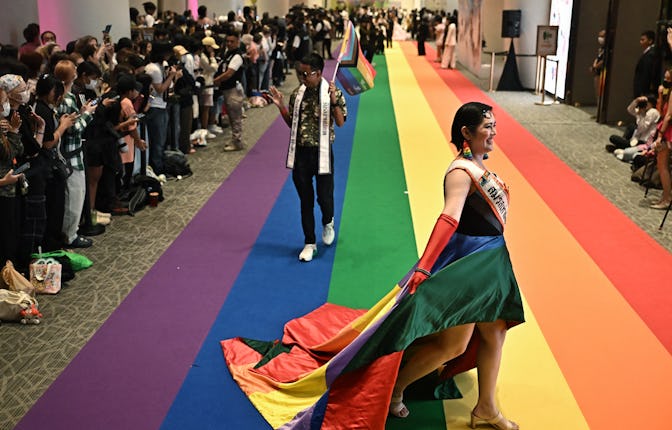Thailand Legalizes Same-Sex Marriage
The first Southeast Asian nation to legalize same-sex marriage could mark a shift for the entire region.

On a warm sunny Thursday in Thailand, the long-awaited equal marriage law came into effect, ushering in a new era for LGBTQ+ rights in Southeast Asia. Couples across the nation celebrated as they tied the knot, marking a significant milestone in a journey that has spanned decades. Among those celebrating were Pisit "Kew" Sirihirunchai and his partner Chanatip "Jane" Sirihirunchai, who became one of the first couples to register their union at a grand event held at one of Bangkok's most iconic shopping malls.
A Historic Day
The atmosphere was electric as hundreds of couples received their marriage certificates, some tearing up with joy while others beamed with pride. District officials organized festivities complete with photo booths and free cupcakes, while one district even offered air tickets to the first couple to register their marriage.
Prime Minister Paetongtarn Shinawatra expressed her support on social media, stating that "the rainbow flag is flying high over Thailand." Activists had set an ambitious target of 1,448 registrations by day's end, referencing the clause in the Thai Civil Code that defines marriage.
The path to this landmark legislation has been fraught with challenges. Activists have fought for nearly two decades to achieve this level of recognition. Until recently, same-sex couples faced significant hurdles when attempting to formalize their relationships.
The new law was passed by parliament in June 2022 after extensive campaigning from LGBTQ+ activists. It reflects changing attitudes within Thai society towards same-sex relationships — an evolution influenced by global trends towards acceptance and equality.
Cultural Impact and Future Challenges
While Thailand's legalization of same-sex marriage is groundbreaking within Asia — joining only Taiwan as a nation with similar laws—challenges remain. Cultural prejudices persist despite legal advancements. Activists emphasize that societal acceptance is crucial for the law's effectiveness; families must embrace LGBTQ+ individuals fully without stigma.
Tom Tan, an advocate for LGBTQ+ rights in Thailand, noted that while legal recognition is vital, societal attitudes must also evolve: "The next step will be for society to fully accept gay parents can have kids..." This sentiment resonates deeply within communities still grappling with traditional views on family structures.
Despite these challenges, many couples are optimistic about their future under the new law. The new legislation clarifies ownership issues that previously left same-sex couples vulnerable.As Thailand steps into this new chapter of inclusivity and equality, it also sets an example for other nations in Southeast Asia grappling with similar issues. The legalization of same-sex marriage is not just a legal victory but also a cultural shift towards acceptance — a reflection of love transcending boundaries.